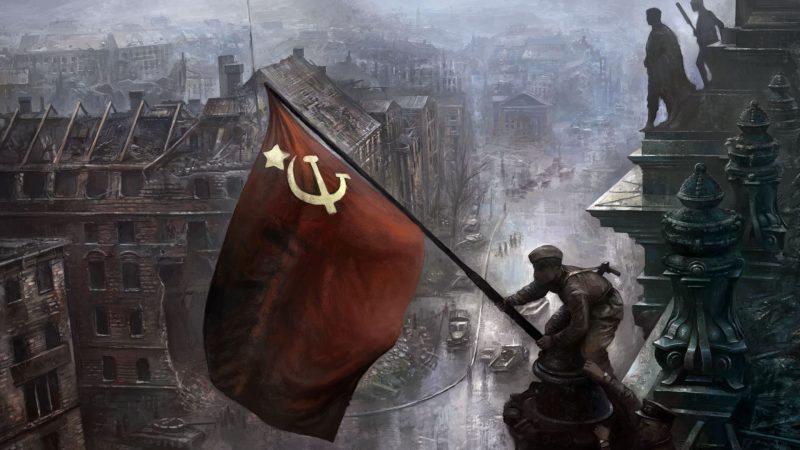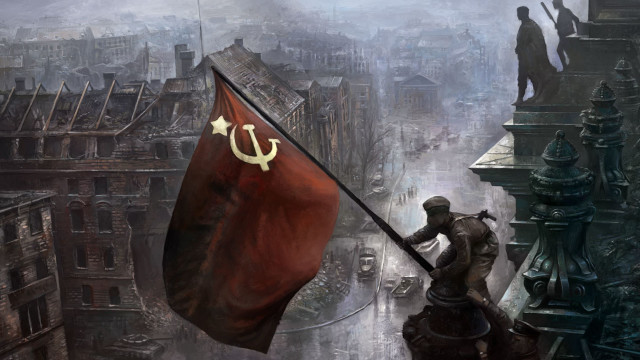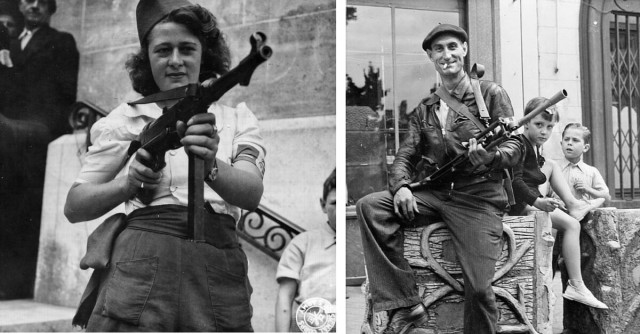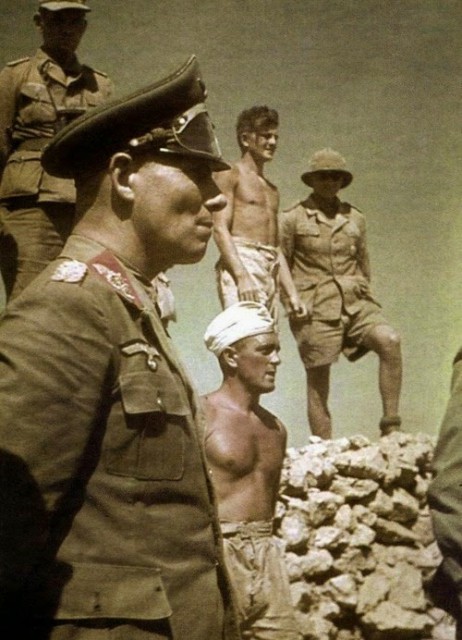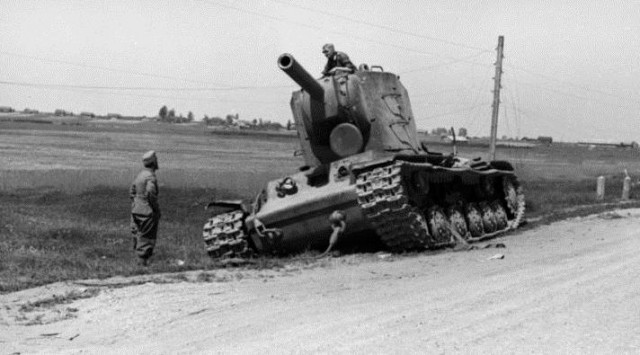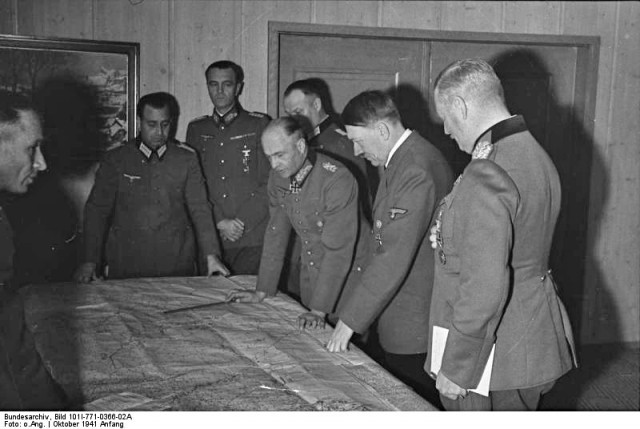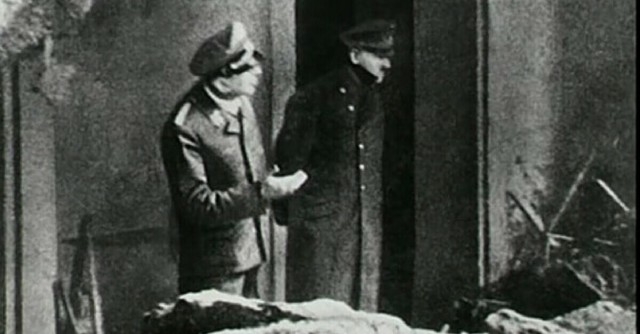One of the things about writing history is that after a while the pieces start to fit together. You know enough about large complex events that their relationship becomes obvious and then history truly becomes a story. Of course my favorite topic to explore is World War II. It is not a topic per se because of its size. It’s more akin to a constellation of stories so vast and complex that the whole tapestry and how it holds together defies comprehension. World War II was the largest event in history, and so exploring it is a lot like getting closer and closer to a fractal graphic.
So why did the Germans, with the most powerful motivated army in the world fail to win the war? The answer for me is obvious: Other than his sociopathic homicidal views, Hitler made really bad decisions. Imagine that at one point in his life he was in jail, dreaming of revenge for the surrender of the German Army and the humiliating and draconian Treaty of Versailles that impoverished an entire generation of Germans. Twelve odd years later he heads an army about 6 million strong, with the best tank corps, the best air force and the best infantry. All of them are inundated with a passion for a cause based in their own victimhood. With a single word he can send twenty outsized panzer divisions a thousand miles in any direction to devastate a town, capture everyone, make them slaves, and smash the armies that stood in his way. He knows with a single word he can take life, or grant it. He knows that he will not be challenged, or if he is, he won’t lose. No matter how shambolic his reasoning, or how loosely woven his goals, he will not lose the battle of whether the decision will be carried out or not. “There will be no repeat of November 1918,” Hitler vows.
Hitler believed in his own invisibility and destiny. Assassination attempts on his life that missed him by moments convinced him that he was supposed to prevail. The annexation of Austria and parts of Czechoslovakia with just a minatory statement or two fed his confidence. The blitzkrieg destruction of the Poles, and in particular the spectacular defeat of the French Army, one of the largest in the world, on their own turf within a month also convinced Hitler that no one would stand up to the adamantine Wehrmacht.
Old Nazis panegyrize the Wehrmacht, knowing how superior a product it was compared to the military forces of opposing nations. Historians and analysts also scratch their heads at the decisions made by Hitler as the war progressed. The heart of the matter was that his management style restricted the flexibility of the German armed forces to react.
Here are the decisions Hitler made that cost him the war.
He did not prepare for resistance or intelligence.
Hitler’s army was the best way to crush another army. Even on the retreat the Germans were so disciplined and so experienced at fighting and had qualitatively better weaponry that they could inflict horrific casualties on you. But fighting is not a monolithic thing. Once the tanks are burning in the fields and the cemeteries are filled with nameless faceless soldiers, the fighting goes on. It just changes. Any kind of resistance is a fight. The French waitress understands German and the inebriated SS officers don’t know it. Passing their drunken musings as tips is a form of resistance. Cutting a Nazi office telephone line is resistance. Spying, like breaking the Enigma Code for example is resistance. Stabbing a Wehrmacht guard to death in the middle of the night is resistance. Conspiring to kill the Fuhrer is resistance. Sabotaging supply lines and shipping is resistance. Hiding the intended target of an attack is resistance. It astonishes how the Germans failed to realize that killing a hundred innocent people as punishment for some crime creates 200 more dissidents. But the cumulative effects of the resistance movement were key in bringing down the Reich.
Resistance came from all sides, particularly in the intelligence field. The Enigma code machine was decrypted at Bletchley Park in 1942. The Japanese encrypted code was broken in the US at around the same time. The German officer corps on vacation in France was an information sieve. Wilhelm Canaris of the Abwehr German intelligence group wanted Hitler dead and out of power, so he helped to deceive him, until he himself was discovered. Canaris prevented the Germans from taking Gibraltar based on bad information fed to him by Abwehr, that was by then, an adytum for disillusioned German defectors. It’s a bad portend when your top intelligence agencies want you to lose. It’s worse when your best response is a bullet to the head.
We talked a lot about deception in the North African desert. There, British magicians literally fooled the Luftwaffe into believing that there were tank battalions were there were none at all. Perhaps being fooled by inflatable fake tanks was too puerile a mistake to admit to Hitler. Operation Mincemeat convinced the German High Command planners that the Allied second front was going to happen not in Normandy but at Calais instead. It was partially achieved by installing fake invasion documents on a dead body dressed as an Allied officer. The Nazis seemed unable to respond to this. Hitler dismissed this as all desperate measures by losers. He was so wrong.
The Nazis were incompetent administrators as well. Yes, they kept copious and meticulous records. But that isn’t managing people. Their management style was a contest to see who could be crueler than the last precept. What this did was create hatred and resistance that bit them in the tuchalesim. When people hate you, they will do everything they can to make you stumble.
He left the European theater of battle.
When the war began Hitler invested four or five out sized divisions to North Africa, ostensibly to take the Egyptian oil fields and feed the Nazi war machine, and secure a southern flank to Germany and Italy their ally. In early fighting, Field Marshall Erwin Rommel did really well, outmatching the maneuvers of Claude Auchinleck and Archibald Alexander, and decimating the first American Expeditionary Force in decades at the Battle of Kasserine Pass. It was Auchinleck that first drove the Afrika Korps back. But it was Bernard Montgomery commanding the British and the French and the US that trapped Rommel in Tunisia. After the British 8th Army rolled up Rommel, Hitler held back supplies to Afrika Korps. The fact of the matter is that Erwin Rommel was more of a folk hero to Hitler than a winning general.
Yes, Rommel was a dynamic and brave general and he impressively wielded his Prussian maneuver warfare…until he ran out of gas. Or rather, Hitler deprived him of it. And he was not receiving reinforcements or new tanks. In fact, at some point in 1943, Hitler decided that North Africa was a red herring and decided instead just to get his gas and oil from the Caucasus Mountains. There the factories were more modern than Egypt’s old oil infrastructure and had a high capacity for production. Essentially he abandoned North Africa as a strategically important target and therein abandoned Rommel. This abandonment no doubt played into the decision by Rommel to have Hitler assassinated.
When the Allies invaded Sicily staging assets out of formerly Nazi North Africa, it never occurred to Hitler that the reason he didn’t have North Africa was because he abandoned it. The point here is that he could have devoted forces to taking North Africa from Gibraltar to the Red Sea, and he could have made the Mediterranean his own lake. This would not have lasted forever, but without depleting his army in Russia, he probably could have fended off attacks to Greater Germania for decades. If he had kept North Africa, he would have had the reserves to build up the Atlantic Wall and keep any significant invasion force off shore. The reason he had to pinpoint where the Allies would land is because he lacked the troop strength to fight the Russians and simultaneously stop a second front and third front from opening.
If the worst happened and Hitler owned continental Europe, and the Brits and the US and the Canadians continued combat operations and strategic bombing, he could have at least negotiated for a Greater Germania. That empire, that Reich that would have included Germany, France, Czechoslovakia, Austria, Belgium, Italy, Hungary, Romania, Greece, Bulgaria, Spain, Egypt, Lybia, and Tunisia.
Instead when he changed his mind midstream, and left North Africa to head east, he shot himself in both feet. His commanders often thought he was an idiot and stormed out of his office. He deucedly made last second impulsive changes to well planned endeavors.
He invaded Russia.
I think about Barbarossa a lot. I guess this is because it was the largest event in contemporary human history. About 9 million people were on the same battlefield that stretched over 800 miles from the Baltic to the Black Sea. During World War II, the Nazis suffered almost 6 million combat deaths and over a million civilian deaths. Most the combat casualties were in the Soviet Union. After the Finns defeated the first Soviet invasion in the Winter War, Hitler is said to have quipped about Russia, “We have only to kick in the Soviet Union’s doors and the whole rotten structure will come crashing down.” It did. And inside it was most of the Wehrmacht.
The force that invaded Russia was divided into three parts. Army Group North, Army Group Center and Army Group South. The supplies for Army Group North alone filled thirty trainloads per day, and after combat losses, sometimes more. This is an amazing and operose supply line to maintain behind an army fighting this hard. It left little room for error because an infantry company that is out of ammo is out of ammo. Imagine the thousand miles the Germans fought through. Imagine going halfway across Central Asia and still not seeing the end of it. Knowing that home is that far behind you. Imagine that they defeat a force of about 3 million men and then have to face another force that’s even bigger, better equipped and more determined.
Hitler’s own racism prevented him from seeing the Bolsheviks as anything but animals. But their determination to keep their homes, and drive out invaders was more than the Wehrmacht could resist. It also surprised Hitler when he saw the appearance of great weapons from the Russians, like the Sturmovik Il-2 attack plane. This armored strike aircraft from Ilyushin was almost impervious to German small arms fire, and the Soviets built 38,000 of them. The Germans couldn’t shoot them out of the sky fast enough, and they were devastating on German armor units. The Mk.VI Tiger I that no one could stop on the battlefield was thoroughly shred by 23mm and 20mm cannon fire from the IL-2.
Hitler also could barely believe that the Russians made a tank that was formidable, fast, and well armored. The T-34 was no match for Tigers or King Tigers in front facing exchanges. But from the side or rear the T-34s were very effective. The Germans built 1200 some odd Tigers and less than 800 King Tigers. Compare that to the Soviets that built 40,000 T-34s by the end of the war. The upgraded T-34-85 had an 85mm high velocity gun that could trade with any Panzer tank. And for every one the Panzers destroyed, ten more came over the hill.
“Quantity is a quality all its own,” Stalin said.
Complexity.
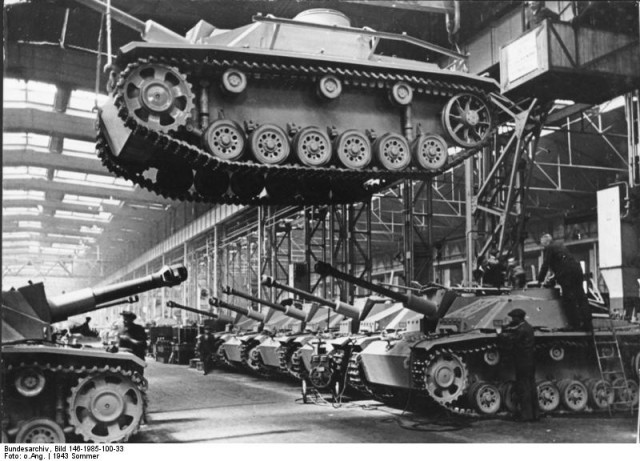
The term Gerry-rigged refers to German tank crews’ improvised repairs coined by the British who called Germans “gerries”. Germans tanks, like all German weapons were complex affairs. Again, Germany built the Tiger I but could only field 1280 of them. German resupply was technically difficult because the German soldier carried more technology with them, and German products often had more moving parts than Russian or American weaponry. The transport aircraft were complex. The parachutes were complex. The German Me- 262 jet fighter was so complex only 1400 could be manufactured in thee years.
German equipment was not intuitive. However firing a Russian weapon like a PPsh machine gun was easy. German infantrymen often captured discarded PPshs and fired them at Russians. The PPsh used the Tokarev 7.62mm pistol round, a round that was available everywhere. It was durable, low cost and could be made from materials found in any machine shop. The German MP-38 and MP-40s were prone to jamming and could not be field stripped and put back together easily, which is why some Germans used Russian weapons. German weapons were not made for the subzero weather of arctic Russian winters. Russian guns had a freeze resistant oil that kept them firing all throughout the siege of Stalingrad. The MP-38 used a double column single feed magazine that jammed all the time, and the Germans could only crank out a million of them. The Russians made over six million PPsh machine guns. In many fields of combat, the German solution was better, when it worked.
Stalin was able to dismantle his factories and move them East out of the range of German aircraft and then have them rebuilt and start producing weapons, all in less than a year. This massive feat for a war machine produced more weapons than the Germans could stop. The T-34 could be made in a few days. A Tiger Tank took months. T-34s had fewer moving parts, and were easy to repair and replace tracks, and none of the work on the tank required one is able to read. This meant a poor Russian peasant farmer could participate in defending the country. A Tiger I tank, on the other hand, was so complex that a few missing spare parts and it was dead in the water. Or, the field, as it were.
Micromanagement.
Convinced that he was a modern Napoleon, Hitler ordered generals around and made rash last minute decisions.
Operation Typhoon, a German attack on Moscow had to wait until more Tiger V Panther tanks could be produced. Panzer commander Heinz Guderian wanted to move with what he had, but Hitler insisted that they wait for his new toy. Later he re-directed half of Guderian’s force south to help bolster a battle forming around Army Group South. By the time the force returned to Army Group Center the Russians had bolstered their defenses so robustly that the Germans never took Moscow.
Hitler would allow no one to retreat. This of course is a ridiculous strategy as troops that survive and retreat often win the day or the war in the end. This resulted in horrific casualties, not the least of which is the famously infamous German 6th Army that surrendered in Stalingrad. Field Marshall Von Paulus and his emaciated, frozen and starved 95,000 Germans were taken prisoner and death marched to a prison camp. Only 5000 returned home. Further north, surrounded by Russians in the Sworbe Pocket in Estonia, Hitler lost thousands of troops who were not allowed to pull out when over run by Red Guards. When the Battle of Kursk fizzled and the Germans were halted, Von Manstein retreated into Kharkov and was told to hold it. He left it against Hitler’s orders anyway, making him one of the few Nazis who openly defied Hitler and lived through it. All over the world Hitler made long distance decisions and his God like power guaranteed that most Germans would stay and die for him.
Someone talked about Donald Rumsfeld’s disasterous management of the Iraq invasion calling him “the 8000 mile screwdriver.” Once the screw is in the slot, the operator is so far away from the solution that any turn of the tool becomes iffy and uninformed.
Hitler moved regiments around like chess pieces, not realizing the depth of bloodshed that each move wrought. The new target of the move into Russia would be the oil fields in and around the Caucasus Mountains. Hitler felt he could kill two birds with one stone: interdict Russian oil supplies and feed his own diesel hungry Army. German Chief of Staff Franz Halder knew better than to argue with Hitler and even once quipped, “it does no good. He just foams at the mouth and yells,” obviously referring to Hitler’s insistence that his own council would he ever keep regarding battlefield command. Halder didn’t feel comfortable enough to point out that the Wehrmacht had already lost 1.1 million men killed or wounded, plus an additional 500,000 men just sick or frostbitten. Most of the infantry divisions were at about half strength. There had been 24,000 vehicles destroyed, many just from the cold and only about 2400 replacement vehicles. Of the pack animals the Wehrmacht drove in or rode in or pulled in, 180,000 of them had perished and they had expropriated about a tenth of that number to replenish the need. Halder felt that the troops were exhausted and desperately needed to rest and re-supply. Hitler would have none of it.
He was ill.
I am adding this addendum. We know that Hitler was showing signs of Parkinsons Disease. We know his left hand trembled, and from his own doctor, he couldn’t eat sleep, or use the restroom without medication. He was most likely addicted to Pervitin, a form of methamphetamine, and opiates. Heinz Gurderian saw Hitler when he visited Army Group Center at the Kursk salient in 1943. Guderian noticed that he was stooped over and diffident. Hitler had extreme gastric problems as well. The addiction and the diseases were probably a by product of the stresses caused by his own crimes. That’s what I’d like to think anyway.
The point here is that when someone is on drugs that addle judgment, then you get addled judgment.
Could Hitler have won?
The question of whether Hitler really could have ever won is valid. In Philip K Dick’s classic The Man In The High Castle, he extrapolates a different world where Roosevelt is assassinated and a weakened America has to surrender to the Axis. We have talked about what the Nazis did to towns in Russia, and what happened two years later when the Red Guard pushed Hitler back into Germany and uncovered the genocide and scorched Earth left behind. This filled them with a fury that few countries have ever seen. There is a point in the nature of things where a nation can be so wrong that the world will not stop until a change is made. Once the world saw the Hell Hitler was creating, a resistance movement would have continued until the Third Reich was brought down. I do not believe that a Man In The High Castle scenario could have happened. I believe that the rest of the world would have fought against a Greater Germania no matter how tough his troops were, and brought them down.
This happens when men pack their rifles and go hunt a man-eating tiger. Sometimes a threat is so terrifyingly evil, people decide they cannot share the Earth with it. And they grab their guns. And hunt it down. And kill it. Whether Adolph Hitler would have died at the German Chancellery on April 30th 1945, or a decade later, his crimes guaranteed that he would be in someone’s crosshairs until it was over.
